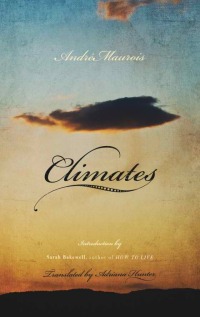Climates by André Maurois
 Friday, December 7, 2012 at 7:46PM
Friday, December 7, 2012 at 7:46PM 
First published in French in 1928; published in translation by Other Press on December 4, 2012
The nature of love and the different ways in which men and women experience it are at the heart of Climates. As a young Frenchman in the early years of the twentieth century, Philippe Marcenat's opinion of women is divided: he admires the female form but feels contempt for the female mind. Desire leads to boredom that can be overcome only by embarking on another conquest. He tells himself that he is searching for the "perfect, almost divine creature" he has imagined since his boyhood, but he finds true love only in the characters of the fiction he devours. Climates is the story of Philippe's relationships with three women -- women he loves in very different ways, and who influence his understanding of love.
Philippe's philandering life changes when he meets Odile Malet in Florence. Odile removes him from his "solitary meditation," makes him take note of the colorful world that surrounds him. It is only after they are married that a crack forms in the "transparent crystal" of Philippe's love. He discovers that Odile has a streak of independence. She lives in the moment, he lives mostly in the past, and they have the usual quarrels about which of them needs to change to accommodate the other's needs. Yet even after Odile gives Philippe good reason to think ill of her, he can form only positive thoughts of "her charm, her mysterious melancholy, her profound childishness."
The novel's second half shifts point of view from Philippe to Isabel, the woman Philippe marries long after losing Odile. Whether due to the change of perspective or because of his experience with Odile, we see a very different Philippe. He has no patience for "superficial sentimentality." While he doted on Odile, he is distant from Isabel. While he consciously overlooked Odile's flaws, he is critical of Isabel's taste and personality. While he wanted to spend all his time alone with Odile, he resents Isabel's desire to be alone with him.
In one respect, however, Philippe never changes: he spends his life searching for an ideal woman. He desperately wanted Odile to be that ideal, and then Isabel, although he recognizes that Isabel is no Odile. Eventually he befriends a woman named Solange, who is closer to Odile than other women he has known. Isabel finds it sad that "poor little Odile lived on in other women, in Solange, in me, each of us striving ... to reconstitute her long-lost grace." The futile search for an ideal (more than one woman accuses Philippe of placing women on pedestals) and the eagerness of women to attempt fulfillment of that ideal is one of Climates' most interesting themes. In one respect, it may be dated -- modern women are less likely to climb atop the pedestal -- but the futile search for imagined perfection retains currency.
The novel invites the reader to ask whether Philippe gains maturity from his relationships. He clearly develops a new (but not terribly flattering) understanding of women after his marriage to Odile: they are "unstable creatures always trying to find a strong directing force to pin down their wandering thoughts and longings," requiring a man to provide "a wealth of constantly changing interests and pleasures" to assure that his mate remains faithful. Near the end of the novel, Philippe lists his revised ideas, including the notion that women are governed by love rather than morality. Readers can form their own judgments as to the accuracy of the lessons that Philippe learns.
Readers can also ponder the conclusions that Isabel draws from her experiences: women in love have no independent personality, but adapt to meet the needs of their lovers; whether the people we love also love another isn't important so long as they love us when they are with us. Do her conclusions reveal her strength or, as her mother-in-law opines, her weakness?
André Maurois' lush, elegant prose and the directness with which he tells the story make Climates a quick read. A touch of melodrama is probably inevitable in a love story written in 1928, but it doesn't overwhelm the novel's subtle points. Fans of romance writing will find much to like in Philippe's heartfelt descriptions of Odile and of his love for her. In the end, I admired Climates for its differing perspectives of love and for the questions that the characters answer in their own ways.
RECOMMENDED